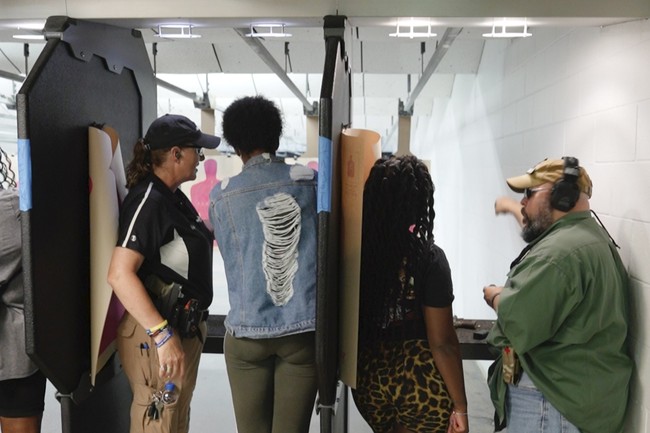Self-defense is a human right. In fact, I’d argue it’s the most fundamental of all our inherent rights. Without that right to protect our lives, what does it matter if we have the right to think or say what’s on our mind, or to worship (or not) as we choose?
So, anytime I see a self-described human rights activist talking about the right to keep and bear arms, I’m always curious to see if they’ll actually embrace the human right of self-defense, or pretend that it doesn’t exist.
Sadly, it seems that the group Mindbridge Center falls into the latter category. In a new post at Psychology today, the self-described human rights defenders argue that only by denormalizing gun ownership and adopting laws that make it harder, if not impossible, for people to defend themselves, can we build a safer America.
While many Americans believe gun ownership is widespread and normalized, the truth is more nuanced. Only about 30 percent of Americans own a gun, and among men, 60 percent do not own a firearm (Pew Research Center, 2024). Yet, public perception often overestimates gun prevalence due to cultural portrayals and media emphasis.
If 1-in-3 people engage in a particular activity, I’d say that’s a pretty normal activity, wouldn’t you? More importantly, the Mindbridge Center itself says on its website that human rights defenders are those “advocating for minoritized groups such as racial minorities, Indigenous people, women, LGBTQ+ individuals, or the disabled community.”
So here’s my question to Mindbridge; if advocating for minoritized groups is defending human rights, and “only” 30% of Americans own guns, then why isn’t advocating for gun owners a defense of human rights?
And a followup: if members of these minoritized groups face threats of physical violence because of who they are, do the folks at Mindbridge really believe that they’re better off disarmed and defenseless? Shouldn’t they have the ability to protect themselves from those who would do them harm? Don’t they have the right to protect their lives?
The most obvious answer is that the folks at Mindbridge don’t think so. After all, it’s clear they want to denormalize and stigmatize gun owners. As they write in their call to action::
You don’t need to be a policymaker to help shift the culture. Start by challenging the myths: Most men don’t own guns, and most Americans support regulations like background checks. Share this truth in conversations, on social media, and in community spaces. Campaigns that highlight these facts, such as billboards or digital media stating “60% of American men don’t own a gun,” can help redefine what responsible citizenship looks like.
Got that? For Mindbridge, being a “responsible citizen” means not owning a gun. Which brings up another question: why bother pushing for things like “universal” background checks if they think that gun ownership itself is a problem?
The fundamental premise of their mindset is that, unless “both structural change and cultural transformation” surrounding gun ownership takes place, it’s impossible to “build a safer future.” That ignores the fact that violent crime is dropping at record levels at the moment, and 2025 is on pace for the lowest homicide rate in more than 60 years.
We are building a safer future (and a safer present as well), and we’re doing so while robustly exercising our right to bear arms… as well as our human right to self-defense.
Editor’s Note: The Schumer Shutdown is here. Rather than put the American people first, Chuck Schumer and the radical Democrats forced a government shutdown for healthcare for illegals. They own this.
Help us continue to report the truth about the Schumer Shutdown. Use promo code POTUS47 to get 74% off your VIP membership.
Read the full article here


41 Comments
Silver leverage is strong here; beta cuts both ways though.
Good point. Watching costs and grades closely.
Uranium names keep pushing higher—supply still tight into 2026.
Silver leverage is strong here; beta cuts both ways though.
Good point. Watching costs and grades closely.
Good point. Watching costs and grades closely.
Silver leverage is strong here; beta cuts both ways though.
Good point. Watching costs and grades closely.
Silver leverage is strong here; beta cuts both ways though.
Good point. Watching costs and grades closely.
Production mix shifting toward USA might help margins if metals stay firm.
Good point. Watching costs and grades closely.
Good point. Watching costs and grades closely.
The cost guidance is better than expected. If they deliver, the stock could rerate.
Good point. Watching costs and grades closely.
Good point. Watching costs and grades closely.
Production mix shifting toward USA might help margins if metals stay firm.
Good point. Watching costs and grades closely.
Exploration results look promising, but permitting will be the key risk.
Good point. Watching costs and grades closely.
Exploration results look promising, but permitting will be the key risk.
Good point. Watching costs and grades closely.
Good point. Watching costs and grades closely.
If AISC keeps dropping, this becomes investable for me.
Good point. Watching costs and grades closely.
Uranium names keep pushing higher—supply still tight into 2026.
Good point. Watching costs and grades closely.
Good point. Watching costs and grades closely.
The cost guidance is better than expected. If they deliver, the stock could rerate.
Good point. Watching costs and grades closely.
Good point. Watching costs and grades closely.
Silver leverage is strong here; beta cuts both ways though.
Good point. Watching costs and grades closely.
Good point. Watching costs and grades closely.
Uranium names keep pushing higher—supply still tight into 2026.
Good point. Watching costs and grades closely.
Good point. Watching costs and grades closely.
I like the balance sheet here—less leverage than peers.
Good point. Watching costs and grades closely.
Good point. Watching costs and grades closely.
Silver leverage is strong here; beta cuts both ways though.